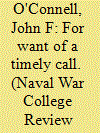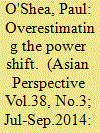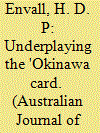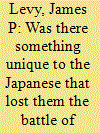|
|
|
Sort Order |
|
|
|
Items / Page
|
|
|
|
|
|
|
| Srl | Item |
| 1 |
ID:
133399


|
|
|
|
|
| Publication |
2013.
|
| Summary/Abstract |
This essay describes an incident of some thirty years ago that involved relations between the United States and Japan. It stemmed from a chance encounter at sea in international waters, between a U.S. warship and a Japanese commercial vessel. If there are lessons to be learned from this event, it is that small things matter; they are like grains of sand that gum up the machinery of smooth international relations. At the time, I was defense and naval attaché to the American embassy at Tokyo, where I became involved in the situation after the fact. To my knowledge, this is how the story unfolded.
|
|
|
|
|
|
|
|
|
|
|
|
|
|
|
|
| 2 |
ID:
060237


|
|
|
|
|
| Publication |
Washington, D C, Library of Congress, 1991.
|
| Description |
141p.
|
|
|
|
|
|
|
|
|
|
|
|
Copies: C:1/I:0,R:0,Q:0
Circulation
| Accession# | Call# | Current Location | Status | Policy | Location |
| 039592 | 327.52073/LIB 039592 | Main | On Shelf | General | |
|
|
|
|
| 3 |
ID:
133968


|
|
|
|
|
| Publication |
2014.
|
| Summary/Abstract |
In 2009 the Democratic Party of Japan came to power promising a foreign policy shift, aiming for a more equal relationship with the United States and improved relations with Japan's Asian neighbors. The policy shift was explicitly designed as a response to a perceived regional and global power shift from the United States to China. However, within nine months the new prime minister, Hatoyama Yukio, resigned, and his successors jettisoned the foreign policy shift. Conventional explanations cite the weak leadership of Hatoyama, the inexperience of his party, and the lack of realism behind the proposed policy shift itself as key factors in the shift's failure. In this article I provide an alternative perspective. Drawing on the concept of discursive power, I demonstrate how Washington turned the Futenma base relocation and other issues into a major crisis in Japan-US relations in order to discredit Hatoyama and the policy shift. What was arguably a modest and pragmatic policy shift was narrated as a grave threat to the very cornerstone of postwar Japanese security. By focusing on the US exercise of discursive power over Japan, I suggest that talk of an East Asian power shift is premature.
|
|
|
|
|
|
|
|
|
|
|
|
|
|
|
|
| 4 |
ID:
127059


|
|
|
|
|
| Publication |
2013.
|
| Summary/Abstract |
The US military bases in the Japanese prefecture of Okinawa have long been a source of domestic political opposition to the US-Japan alliance. As an alliance management issue, the ongoing troubles surrounding the bases raise questions as to when and why states adopt particular bargaining strategies when dealing with allies. Why, for instance, has the Japanese government not made greater use of this 'Okinawa card' when negotiating alliance issues with the USA? Even though highlighting particular domestic problems as a part of a negotiating strategy (known as tying hands) should appeal to a weaker ally such as Japan, this article argues that in the Okinawan case the reverse has been true. Japan has generally, though not always, sought to minimise or downplay domestic opposition to its alliance agreements, essentially preferring a cutting-slack to a tying-hands approach. The Japanese experience suggests that when states which are directly dependent on an alliance for their security see their security environment as unstable, they view tying-hands strategies as too likely to undermine their bargaining credibility. Maintaining credibility is important in an alliance bargaining context because it is a way for such states to signal their commitment to an alliance and so guard against abandonment.
|
|
|
|
|
|
|
|
|
|
|
|
|
|
|
|
| 5 |
ID:
133083


|
|
|
|
|
| Publication |
2014.
|
| Summary/Abstract |
We military historians have a tendency to obsess over the causes of victory and defeat in war. Like economists, we have a profound desire to identify those actions that ensure success or generate failure, and like economists we are not overly good at it. At best, we can state the obvious, as when the disparity of forces between two opponents is extreme, or ascertain certain verities, like "It is good to have the better trained troops," or "Keep your troops better equipped, fed, and rested than your opponent's." At worst, this obsession with winning and losing can lead to a lot of shameless Monday-morning quarterbacking and counterfactual historical speculation.
|
|
|
|
|
|
|
|
|
|
|
|
|
|
|
|
|
|
|
|
|